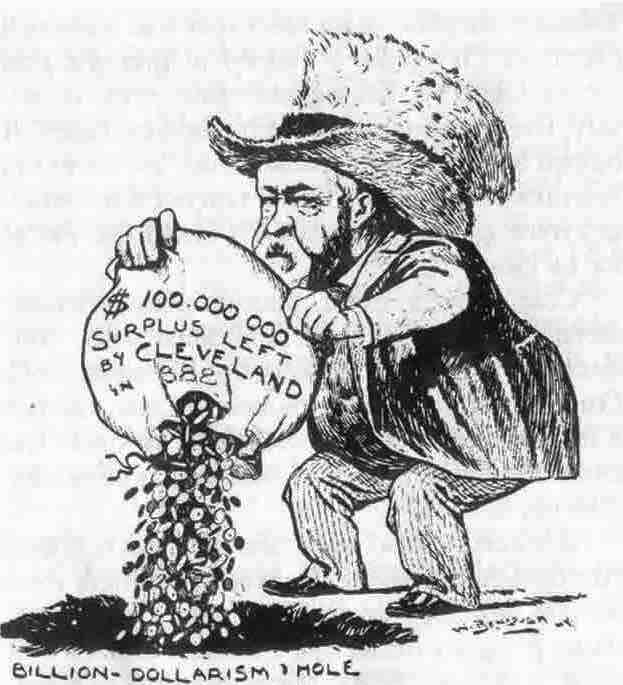The 1888 election for president of the United States saw Grover Cleveland of New York, the incumbent president and a Democrat, try to secure a second term against the Republican nominee, Benjamin Harrison, a former U.S. Senator from Indiana. Tariff policy was the principal issue in the election. Harrison took the side of industrialists and factory workers who wanted to keep tariffs high, while Cleveland strenuously denounced high tariffs as unfair to consumers. His opposition to Civil War pensions and inflated currency also made enemies among veterans and farmers. On the other hand, he held a strong hand in the South and border states, and appealed to former Republican Mugwumps. The economy was prosperous and the nation was at peace, but Cleveland lost reelection in the Electoral College, even though he won a plurality of the popular vote by a narrow margin. Harrison was sworn into office on March 4, 1889.
Civil Service Reform
Civil service reform was a prominent issue following Harrison's election. Harrison had campaigned as a supporter of the merit system, as opposed to the spoils system. Although some U.S. civil service jobs had been classified under the Pendleton Act by previous administrations, Harrison spent much of his first months in office deciding on political appointments.
Congress was widely divided on the issue, and Harrison was reluctant to address the issue because he feared alienating either side. The issue became a political football of the time and was immortalized in a cartoon captioned, "What can I do when both parties insist on kicking?" Harrison appointed Theodore Roosevelt and Hugh Smith Thompson, both reformers, to the Civil Service Commission, but otherwise did little to further the reform cause.
Pension Reform
Harrison quickly saw the enactment of the Dependent and Disability Pension Act in 1890, a cause he had championed while in Congress. In addition to providing pensions to disabled Civil War veterans, regardless of the cause of their disability, the act depleted some of the troublesome federal budget surplus. Pension expenditures reached $135 million under Harrison, the largest expenditure of its kind at that point in American history, a problem exacerbated by Pension Bureau commissioner James R. Tanner's expansive interpretation of the pension laws.
The 51st Congress
The 51st U.S. Congress, referred to by some critics as the "Billion Dollar Congress," was a meeting of the legislative branch of the U.S. federal government that met in Washington, D.C., from March 4, 1889, to March 4, 1891, during the first two years of the administration of President Benjamin Harrison.
Legislative Achievements
The 51st Congress was responsible for a number of pieces of landmark legislation, many of which expanded the authority of the federal government. Emboldened by their success in the elections of 1888, the Republicans enacted virtually their entire platform during their first 303-day session, including a measure that provided American Civil War veterans with generous pensions and expanded the list of eligible recipients to include noncombatants and the children of veterans. Grover Cleveland had vetoed a similar bill in 1887. The 51st Congress was criticized as the "Billion Dollar Congress'" for its lavish spending, and for this reason, it incited drastic reversals in public support that led to Cleveland's reelection in 1892 .

The "Billion Dollar Congress"
In this cartoon from Puck, Benjamin Harrison and the "Billion Dollar Congress" are portrayed as wasting the surplus.
Economic and Trade Legislation
Other important legislation passed into law by the Congress included the McKinley tariff, authored by representative, and future president, William McKinley. The Sherman Antitrust Act, which prohibited business combinations that restricted trade, and the Sherman Silver Purchase Act, which required the U.S. government to mint silver were both authored by Senator John Sherman.
National Forests
The 51st Congress also was responsible for passing the Land Revision Act of 1891, which created the national forests. Harrison authorized America's first forest reserve in Yellowstone, Wyoming, the same year.
Significant Legislation That Failed
Other bills were discussed but failed to pass, including two significant pieces of legislation focused on ensuring African Americans the right to vote. Henry Cabot Lodge sponsored a so-called Lodge Bill that would have established federal supervision of congressional elections so as to prevent the disfranchisement of southern blacks. Henry W. Blair sponsored the Blair Education Bill, which advocated the use of federal aid for education in order to frustrate Southern whites employing literacy tests to prevent blacks from registering to vote.